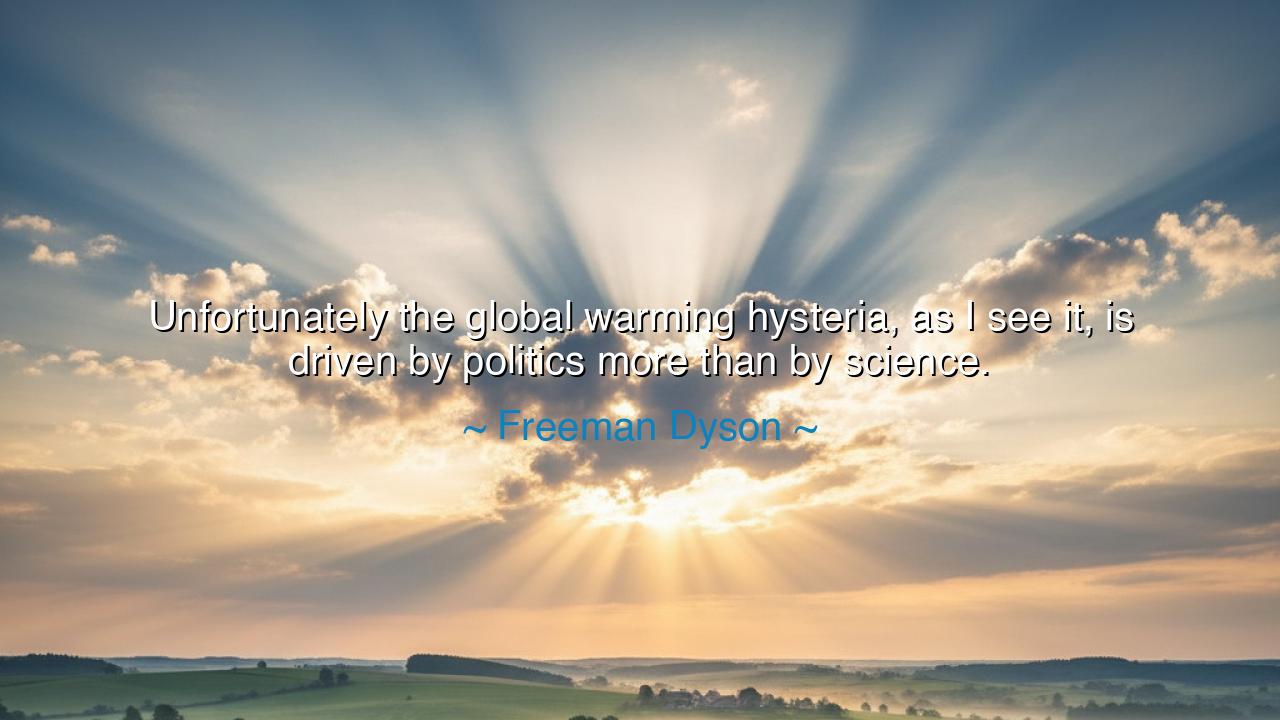
Unfortunately the global warming hysteria, as I see it, is driven
Unfortunately the global warming hysteria, as I see it, is driven by politics more than by science.






"Unfortunately, the global warming hysteria, as I see it, is driven by politics more than by science." These words, spoken by the great Freeman Dyson, echo through the halls of reason, urging us to pause and reflect on the true nature of the storm that has swept across our world. For in these words, Dyson speaks not merely of the scientific debate over global warming, but of the dangers that arise when politics entwines itself with science. It is a truth that speaks to the heart of human nature, a reminder that the pursuit of truth, of knowledge, must never be clouded by the ambitions and agendas of those who seek power.
At the core of Dyson’s statement is the recognition that science, in its purest form, seeks only the truth. It does not seek to serve political or ideological ends, but to uncover the laws that govern the natural world. Yet, time and again, throughout history, we have seen how knowledge can be manipulated to fit the whims of those in power. Politics, driven by the thirst for influence and control, has often sought to shape the narrative, to twist the facts in ways that serve their purposes, rather than serve the people. Dyson warns us that the hysteria surrounding global warming is not solely a product of scientific consensus but a creation of political forces that have seized upon the issue for their own gain.
Consider, if you will, the tale of Galileo Galilei, who faced the wrath of the Church not because of his science, but because of the political and religious powers that sought to suppress the truth. Galileo’s findings—his discoveries about the heavens, his demonstration that the earth revolves around the sun—were not controversial in their scientific merit. They were controversial because they threatened the political and religious institutions that held sway over the minds of the people. The Church, not wanting to lose its power, sought to silence Galileo, not on the grounds of science, but on the grounds of its own authority. In this, we see how easily the search for truth can become entangled with the desires of those in power.
And so it is with global warming. Dyson’s words remind us that science is not a tool to be wielded in the service of political ideologies. The facts of climate change are clear, but the way in which they are presented, the narratives that are spun around them, are often driven by the forces of politics. It is not uncommon for issues of great importance to become politicized, for truths to be overshadowed by the needs of those who seek to harness them for power. The hysteria that surrounds the issue can often cloud the clear-eyed, rational discourse that is needed to address it. Instead of focusing on thoughtful, evidence-based solutions, we find ourselves mired in debate, with each side using the issue as a tool to further its own ends.
Dyson’s insight calls us to strip away the hysteria, to look beyond the political noise and focus on the science itself. The truth of global warming—like the truth of Galileo’s discoveries—is not subject to the whims of political agendas. It is a natural law, unfolding before our eyes. The science of climate change is not a matter of opinion or belief; it is a matter of fact. The rising temperatures, the shrinking ice caps, the changing weather patterns—all of these are the undeniable evidence that the planet is warming. But what Dyson urges us to see is that we must approach this issue not with fear or with political motivation, but with the steady hand of reason and the pursuit of real solutions.
To those who would listen, Dyson offers a crucial lesson: that we must not allow the forces of politics to obscure the path to truth. Whether in matters of science, medicine, or society, we must resist the temptation to allow our actions to be driven by the loudest voices, by those who would manipulate our fears for their own gain. Instead, we must return to the roots of rationality, to the pursuit of knowledge, and to solutions that are grounded in evidence, not in the ambitions of those who seek to wield it for their own ends.
In our own lives, we must ask ourselves: Are we being guided by the truth, or by the narratives that others seek to impose upon us? Let us approach the great challenges of our time—whether it be climate change, health, or society—with the wisdom to separate science from politics, and to seek solutions that are driven by reason, not by hysteria. The time has come to reclaim the truth from the hands of those who would twist it, to restore the clarity of science, and to act not out of fear or division, but with the steady resolve of those who know that the future of our world depends on the choices we make today.






AAdministratorAdministrator
Welcome, honored guests. Please leave a comment, we will respond soon